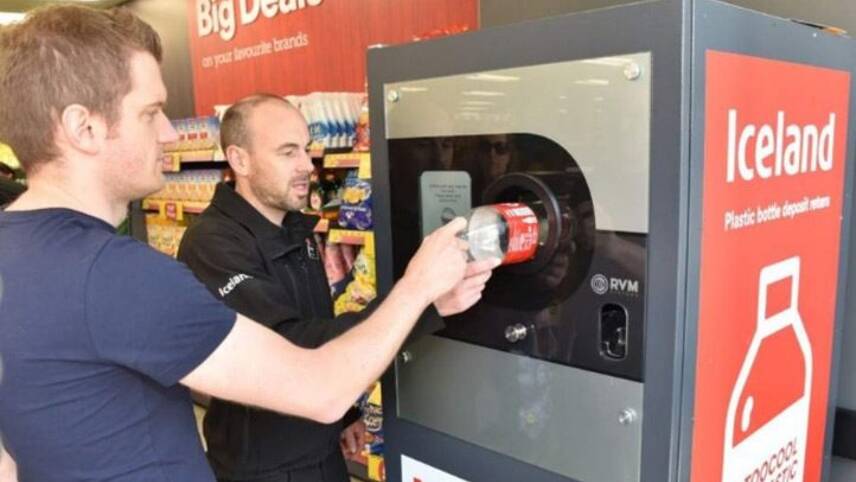Register for free and continue reading
Join our growing army of changemakers and get unlimited access to our premium content

The reverse vending machines offer users a 10p discount coupon for every plastic bottle inserted
Launched to show the company’s support for the implementation of a nationwide deposit-return scheme, the trial saw reverse vending machines installed at four Iceland stores – in Wolverhampton, Mold, Fulham and Musselburgh – during May and June 2018.
A further machine was then installed at Iceland’s head office, in Deeside, and others were added to its stores in Belfast and Leeds earlier this year.
The reverse-vending units accept any of the chain’s own-brand beverage bottles and repay users with a 10p voucher to be used in-store for each bottle inserted. Once bottles are captured, they are cleaned and sent to recycling facilities.
Iceland today posted an update on the scheme’s results, revealing that more than one million plastic bottles have been captured using the network of machines to date.
The retailer has also been asking customers what they make of the machines during the scheme, with 95% of shoppers to have responded to its survey having said they believe deposit return systems should be operated by all UK retailers.
Of the respondents to the survey, two-thirds said they used Iceland’s reverse-vending offer at least once every fortnight, Moreover, three-quarters saying they would support a national deposit return scheme for plastic drinks bottles if the deposit was set at 20p per container – the same rate set for Scotland.
“The results from our reverse vending machine trials highlight the growing demand from consumers to have a deposit return scheme introduced across the UK,” Iceland’s managing director Richard Walker said.
“Iceland was the first retailer to trial reverse vending machines and we believe the customer feedback we have received shows that our simple model of accepting all sizes of plastic drinks bottle – and extending this to include drinks cans – is the only sensible way to roll out a deposit return scheme nationally.”
Policy shift
Walker’s comments come as the Department for Food, the Environment and Rural Affairs (Defra) is consulting with businesses, academics and members of the general public to determine how, exactly, a national deposit return scheme should operate.
The government is exploring two variants of the system, which will operate for cans and plastic and glass bottles. An “all-in” model would focus on all beverages placed on the market, irrespective of size, while the second, “on-the-go” model would restrict drinks containers that could operate in the system to less than 750ml and sold in a single format.
Prior to this month’s cabinet reshuffle, Michael Gove, then Environment Secretary, publicly backed the “all-in” model and urged other Ministers to follow suit. Gove claimed that, compared to the “on-the-go” model, the scheme would better create a “clearer financial and social signal to recycle” for consumers and businesses alike.
Whichever of the two options is selected, the deposit return scheme is not expected to be rolled out until 2023. It will form a key facet of the Government’s Resources and Waste Strategy (RWS), which also details major overhauls to household waste collections and the Extended Producer Responsibility (EPR) system.
Resources & Waste Strategy: A blueprint for business leadership
This edie insight guide provides sustainability and environmental professionals with a detailed breakdown of all of the key elements of the RWS, and what they mean for business.
The 21-page guide, sponsored by Helistrat, gives edie readers everything they need to know about the Resources & Waste Strategy without having to trawl through the 146-page Government document themselves.
We explore the business implications of the ‘big ticket’ items of the Strategy – such as the “polluter pays” principle; Extended Producer Responsibility (EPR); and the much-heralded plans for a deposit-return scheme for single-use plastic bottles.
Download the report here.
Sarah George


Please login or Register to leave a comment.